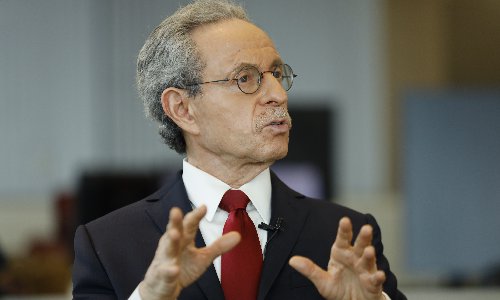
Illustration: Liu Xidan/GT
Editor's Note:
China had an epic decade since 2012. Particularly in the last five years, which are truly momentous, extraordinary, the country has successfully dealt with major challenges including turbulent developments in Hong Kong Special Administrative Region and the COVID-19 epidemic. The 20th National Congress of the Communist Party of China (CPC) will lay out plans for the strategic missions and major measures in the next five years, getting the efforts to build a modern socialist country in all respects off to a good start.
"China's stability, consistency and predictability can become geo-economic ballast, steadying a swaying world," said Robert Lawrence Kuhn (Kuhn), an international corporate strategist, investment banker, and the chairman of The Kuhn Foundation. He shared his views on the ongoing 20th National Congress of the CPC in a written interview with Global Times (GT) reporter Yu Jincui.
GT: You are a long-term China observer and visited China many times. Regarding China's development, over the past 10 years, what impressed you the most and why do you think China can make the achievement?
Kuhn: I have been coming to China for more than 30 years; I have been telling China's story to the world in various forms — and although China has many achievements, and there have been numerous stories to tell, none has been as representative of the real China, and none has been so powerful in impact, as China's commitment to eradicate all extreme poverty in the country and China's systematic implementation that made it happen by 2021.
I have found that China's poverty alleviation program is the best story to undermine biases and disrupt stereotypes about China. A good part of the reason is that foreigners had very limited knowledge of China's poverty alleviation commitment and campaign — how it really worked.
If foreigners read anything about poverty alleviation in China, it would be general and broad, using big numbers, such as "800 million people", which are impressive, of course, but moved no emotions. To truly understand China's poverty alleviation is to hear the stories of individual families who have emerged from poverty — that's multiple millions of stories.
GT: What do the five years since the 19th National Congress of the CPC mean for the CPC?
Kuhn: The past five years have witnessed extraordinary challenges and extraordinary achievements for China in general and the CPC in particular. We can list some of the most important: (i) the COVID-19 pandemic and China's success in minimizing cases and deaths far below that of other countries; (ii) China's economy, which has continued to grow despite various headwinds; (iii) China's society, especially the transformations of poverty alleviation, rural vitalization and Common Prosperity; (iv) China's diplomacy, which has become more confident, countering accusations by largely developed countries in the Global North and deepening relations with largely developing countries in the Global South; (v) China's military/defense strength, which has continued to grow, especially the PLA Navy; (vi) the CPC fulfilling its commitment to self-purify by its relentless anti-corruption campaign.
GT: What are the lessons and inspirations of the Chinese path for other developing countries?
Kuhn: Although all developing countries have different conditions and cultures, China's extraordinary poverty alleviation experience and success can play an important part. Among developing countries, only China has achieved rapid development and large-scale poverty reduction, with the poor sharing the fruits of reform and opening up over the four decades and with the intractably poor finally brought out of poverty over the last seven years or so. For good reason, China's poverty alleviation accomplishments have been called a developmental miracle.
When China eradicated all extreme poverty in 2021, China achieved the poverty reduction goal of the United Nations 2030 Agenda for Sustainable Development 10 years ahead of schedule. No other country has brought so many people out of poverty, and did so in such a short period of time.
What can the world learn from China's success in poverty alleviation? Many things. Certainly, China is committed to sharing its poverty-reduction experience with the world community, especially with the poorest nations — strategy, structure, programs, systems, insights, checks and balances — all aspects.
Each country is different. Each culture has its own history and culture; the natures of different peoples are indeed different. We cannot take programs from one country and impose them wholly, without adaptation, on another country
However, the principles are what's important. And China's principles of poverty alleviation are clear: "targeted" poverty alleviation employs specific measures to fit specific circumstances and needs, and a clear organizational structure to implement those measures, monitor them, and check them.
Nonetheless, to me, what is even more clear is this. For a country to make a success of poverty alleviation, the number one criterion is that the leader of the country must make an absolute and resolute commitment to accomplish it. Again, General Secretary Xi's unambiguous assertion: "I have spent more energy on poverty alleviation than on anything else." This sends a powerful message to officials at all levels, indeed to the entire country.
So, this is the big lesson to learn: the senior leader of the country needs to make the overall mission of poverty alleviation a high priority for the nation. Nothing less will work well.

Setting the role of a journalist aside, R.L. Kuhn explains a "real" China from his interpretation as an observer. Photo: Li Hao/GT
GT: All countries in the world face a series of uncertainties and challenges in the next five years. What does China's stability and certainty as a major power mean for the world?
Kuhn: Stability, consistency and predictability are as essential for national development as they are for stock market valuations. Global geopolitics and the global economy have not been this unstable, inconsistent and unpredictable in generations, from the mutating and still-raging pandemic to the numerous conflicts on or across borders, to heightened great power confrontations. Thus, given such world volatility, China's stability, consistency and predictability can become geo-economic ballast, steadying a swaying world.
GT: Compared with Western political parties, one of the major features and strengths of the CPC is self-revolution. How do you understand the CPC's self-revolution?
Kuhn: All political parties, in every country and of every variety, seek to make themselves as effective as possible and to look as good as possible to their constituents (usually voters).
For the world to understand China, it must understand why the CPC asserts that its continuous governing leadership is optimum for China's development. But for the CPC to retain its ruling status, it has a higher obligation to govern itself properly, maintain highest standards of rectitude and probity.
Anti-corruption, of course, is the centerpiece of the Party's self-revolution. General Secretary Xi Jinping said early on in his unprecedented and sustained anti-corruption campaign that "Worms can only grow in something rotten." "Corruption is now raging," he warned, "if it is not curbed, our Party and country will surely be doomed."
Xi's solution is a system that checks the exercise of power, grants oversight powers to the people, and makes the exercise of power more transparent and institutionalized.
CPC self-revolution, embedding tough internal checks-and-balances, is a relentless process that can never stop.
GT: How do you see the significance of the 20th CPC National Congress?
Kuhn: CPC National Congresses, held every five years, normally set the agenda for the ensuing five years. The significance of the 20th CPC National Congress is not only will it set the agenda for the ensuing five years (2023-2027), it will also draft the roadmap for the next 13 years to 2035 and sharpen the vision for 2049, the 100th anniversary of the founding of the People's Republic of China, when a modern socialist country that is prosperous, strong, democratic, culturally advanced and harmonious is expected to be built. Thus, the 20th CPC National Congress is axial to China's New Era.





